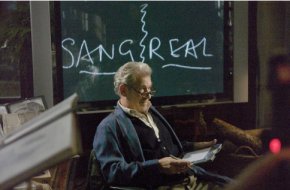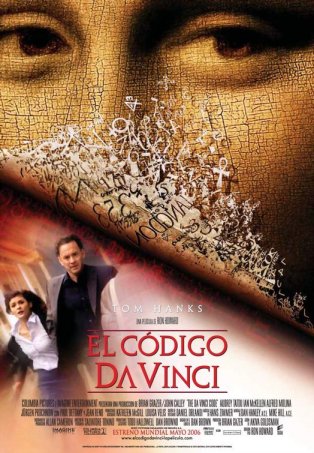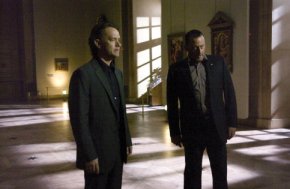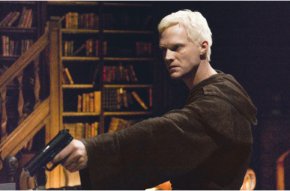Credit that to Ron Howard giving the audience plenty of
time to focus on Hanks' hair while tons of expository dialogue
whisks past their heads. Like Dan Brown's novel, The
Da Vinci Code piles breathtaking beats on top of a lot
of explanation, and finding the right rhythm is tricky.
The film exposes the strengths and the weaknesses of the
source novel that everyone except perhaps my mother has
read. At its heart, we see only minimal character development.
Even Hanks' code expert Robert Langdon is just a shadow
waiting for a noble actor to inhabit him. If the villains
seem particularly cardboard to you, blame Brown and perhaps
screenwriter Akiva Goldsman, who chose not to fill in any
blanks but trusted the premise to carry things through.
Up to a point, it does. Howard captures key moments from
the book, following the plot fairly closely. In a couple
of places, he tries to throw in a little innovation, going
for historical flashbacks that look sort of like colorized
silent films. Crowd scenes always feel like they're difficult
for Howard.
Subtle touches may even be brushed against, such as a
recurring image of a trident alternating between innocence
and evil. From the moment we meet Langdon, in fact, he's
an equivocator, fascinated by the sliding meanings of symbols.
That alone should tick off those outraged by the subject
matter; at best, Langdon is a moral relativist. As the murdered
Jacques Saniere (Jean-Pierre Marielle) once called him,
he's a beat cop of history, trying not to take sides.
Until, of course, he gets framed for murder by Opus Dei.
Even there, it feels like Goldsman's screenplay backs down
from the harsher elements of the novel, making it a little
clearer that not everyone involved in the conservative Catholic
organization has their priorities severely out of whack.
In fact, many members of Opus Dei are not carefully channeled
psychopathic albino monks at all.
That monk Silas (Paul Bettany), however, does give Howard
a chance to throw some energy in his first act. Figuring
out what's going on relies again on all kinds of codes and
anagrams; it's hard to make thinking look compelling on
screen.
At least with the unstoppable monk, we get an early sense
of danger, compounded by the smug Alfred Molina as the misguided
(really, just misguided, Opus Dei) Bishop Aringarosa. Both
actors do a nice job of impersonating Antonio Banderas,
though Bettany chooses to go through the film with a pained
sneer that wins my coveted wooden puppet award. For all
the acting he gets to do, he could have been replaced by
a wooden puppet with one single carved expression. Runner-up:
Jean Reno, unable to shake his vague embarrassment from
having been in The Pink Panther. Congratulations,
guys.
 |
Howard just doesn't seem to trust his actors to do what
they do best, though there's absolutely no stopping Sir
Ian McKellen from bubbling over as Leigh Teabing. Thankfully,
he shows up at a point when the film desperately needs energy.
In scenes with Hanks, that energy spills over, and you can
see two actors giving and taking and generally having a
good time.
For the most part, though, Hanks looks pained, rarely
getting to turn on his charm. Goldsman gutted any whiff
of eroticism to the character, thus rendering Hanks a neutered
wise father figure to Audrey Tautou's Sophie Neveu. It may
not be that the age difference is too great; it's that Tautou
still seems so wide-eyed and innocent even as a cynical
police cryptographer. Oh, it's so hard to watch our little
Amelie grow up.
For a story with the secret that this has, it's ironic
that sex has been almost utterly removed from the equation.
Though Saniere still takes part in a Gnostic ritual, certain
plot points have been changed in order to make it palatable
for audiences that will sit through all kinds of violence
but not sexual complexity.
As a director, Howard has always been only as good as
his material. This makes The Da Vinci Code just what
the book was - interesting enough to pass the time, but
in a few years, everyone will wonder what the fuss was about.
In the meantime, it sparks debate deeper than the movie
itself, which can only be a good thing. And it will take
you half the time to watch it as it does to read it, so
that, too is a plus.
If you're really interested, though, you should just read
Elaine Pagels.
Rating: 









